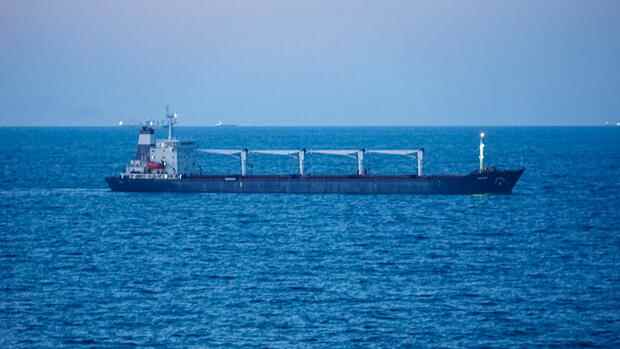AUGUST 2, 2022: The Razoni bulk carrier under the flag of Sierra Leone, loaded with Ukrainian grain, is pictured off Turkey s coast. The ship left the port of Odessa on August 1. Representatives of Turkey, Russia, Ukraine and the United Nations, members of the Joint Coordination Centre, will inspect the vessel on August 3. Russia, Ukraine, Turkey and the UN signed a deal to resume Ukrainian grain exports through the Black Sea on July 22. Turkey’s Defense Ministry/TASS THIS IMAGE WAS PROVIDED BY A THIRD PARTY. EDITORIAL USE ONLY PUBLICATIONxINxGERxAUTxONLY TS13CBB6
(Photo: IMAGO/ITAR-TASS)
Russia has blocked the grain deal with Ukraine, preventing the country from exporting wheat and corn. The reason was a drone attack on the Russian fleet in the Black Sea. With this, Moscow wants to make it clear who is in charge of the conflict.
According to Turkish President Erdogan, who brokered the deal, the agreement is now active again. After three days, Ukrainian grain ships should be allowed to sail again today. Nevertheless, the international community should consider carefully whether it is right to extend the agreement, which expires in mid-November, as planned. Under certain circumstances, Ukraine would be helped more if the agreement simply expired – and Russia was thus deprived of one of its last political levers.
Moscow initially signaled its willingness to engage in dialogue with the approval in July. In the West it was hoped that the grain deal would persuade Russia to give in; in Ukraine, on the other hand, to extend the pact to other export products such as steel.
Instead of a de-escalation, the war escalated. A few weeks ago, Russia put pressure on it to relax Western sanctions on Russian fertilizer exports in return for the agreement.
Top jobs of the day
Find the best jobs now and
be notified by email.
The agreement was signed in July to export up to 22 million tons of Ukrainian grain safely through the Black Sea to world markets by mid-November. The agreement was a diplomatic success, but it is questionable whether it is worth extending the agreement. Because instead of the hoped-for 22 million tons, nine million tons of grain and maize were exported by sea. Overall, this is not even five percent of the global export volume.
Since July, the main recipient countries of Ukrainian wheat have been Spain, Italy, Turkey, China and the Netherlands. The grain probably ends up there as animal feed on fattening farms. Previously, the relatively poorer countries of Egypt, Indonesia and Bangladesh in particular bought their grain from Ukraine, which apparently have long been sourcing their grain from other sources. In addition, Ukraine has expanded its export opportunities overland. Hundreds of thousands of tons of grain leave the country by rail or truck.
So nobody need fear another crisis on the world markets when the grain deal expires in a few weeks. For this, Russia would lose one of its last political levers in the conflict with Ukraine.
More: How Putin expels hundreds of thousands of Russians
